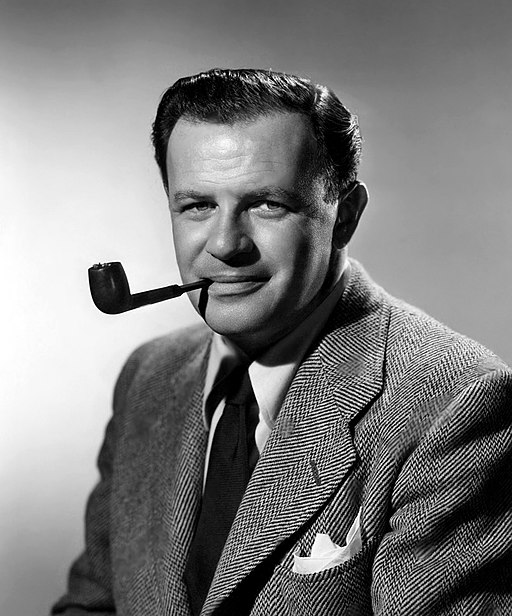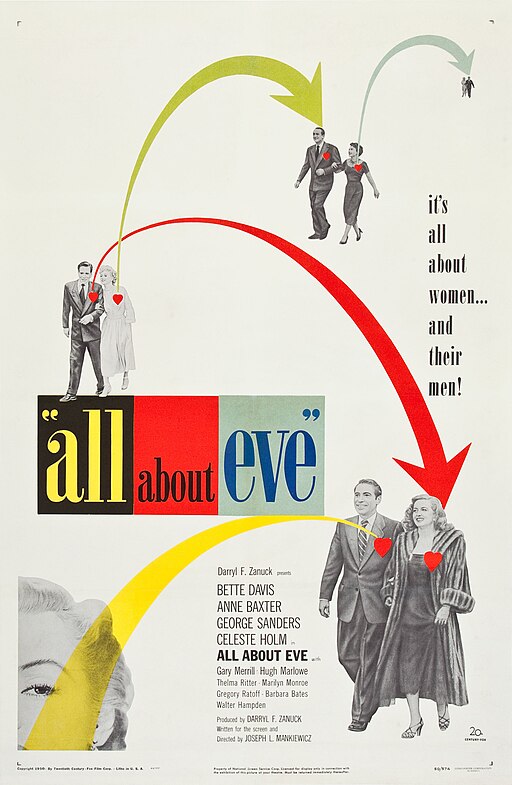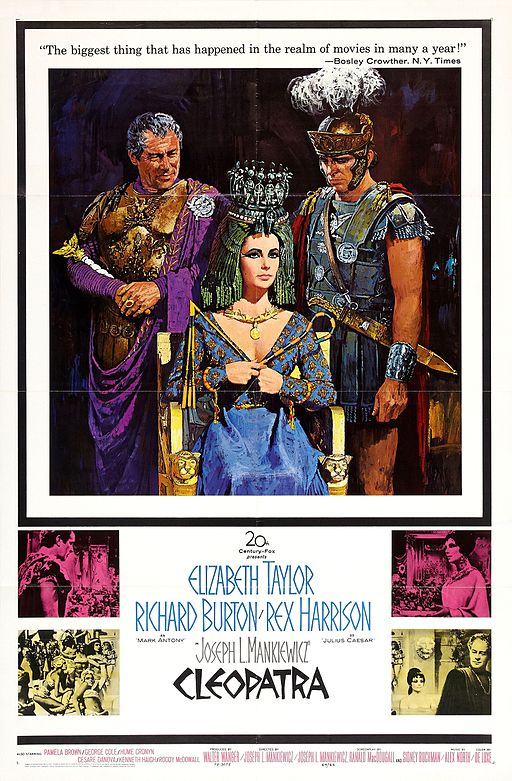Joseph L. Mankiewicz
back| Full Name | Joseph Leo Mankiewicz |
| Born | February 11, 1909 |
| Birthplace | Wilkes-Barre, Pennsylvania, USA |
| Died | February 5, 1993 |
| Buried | Saint Matthew's Episcopal Churchyard, Bedford, New York, USA |
| Married to | Mankiewicz was married three times. His first marriage was to Elizabeth Young in 1934 (divorced in 1937), his second marriage was to Rose Stradner in 1939 (until her death in 1958), his third marriage was to Rosemary Matthews in 1962. |
| Children | Mankiewicz had two sons with his second wife, Rose Stradner: Christopher Mankiewicz and Thomas Mankiewicz. Thomas became a screenwriter, story editor, and producer. |
| Notable films | All About Eve (1950) - A Letter to Three Wives (1949) - The Ghost and Mrs. Muir (1947) - Julius Caesar (1953) - Cleopatra (1963) |
Joseph L. Mankiewicz
The Cinematic Maestro
Joseph L. Mankiewicz was known for his ability to write sharp, intelligent dialogues and for his interest in complex character studies. He won four Academy Awards during his career, two for Best Director and two for Best Screenplay, both for "A Letter to Three Wives" and "All About Eve."
Mankiewicz's work has had a lasting impact on the film industry, and he is remembered as one of Hollywood's greatest filmmakers.
Related
Joseph L. Mankiewicz (1909 – 1993)
Biography and Career Overview
Joseph Leo Mankiewicz was an emblematic figure in the Golden Age of Hollywood, revered not only for his directorial prowess but also for his incisive screenwriting and adept production skills. Born on February 11, 1909, in Wilkes-Barre, Pennsylvania, Mankiewicz was destined for a life steeped in cinematic storytelling, emerging from a family with deep roots in the film industry. His younger brother, Herman J. Mankiewicz, would also leave an indelible mark on cinema as the screenwriter of "Citizen Kane."
Mankiewicz's early life was marked by a profound engagement with literature and the arts, influenced by his German immigrant parents. This intellectual upbringing paved the way for his eventual foray into filmmaking. After attending Columbia University, he moved to Berlin to work as a translator before making his way into the film industry upon his return to the United States.
His career began in the late 1920s at Paramount Pictures, where he started as a title writer during the transition from silent to sound films. His talent for crafting compelling narratives quickly propelled him through the ranks of the industry. By the 1930s, Mankiewicz had become a respected screenwriter and producer, working for major studios such as MGM, where he contributed to the success of many films, including the production of "The Philadelphia Story" (1940), which earned him his first Academy Award nomination.
The 1940s and 1950s represented the zenith of Mankiewicz's career, a period during which he directed and wrote some of his most celebrated films. "A Letter to Three Wives" (1949) showcased his ability to weave intricate stories and earned him two Oscars for Best Director and Best Screenplay. However, it was "All About Eve" (1950) that cemented his legacy. This film, a biting critique of ambition and betrayal in the theater world, received 14 Academy Award nominations and won six, including Best Picture, with Mankiewicz once again taking home awards for both Directing and Screenwriting.
Beyond these professional achievements, Mankiewicz's life was rich and complex. He was married three times, first to Elizabeth Young, then to actress Rose Stradner, with whom he had two sons, and finally to Rosemary Matthews. His second marriage to Stradner was particularly tumultuous, marked by Stradner's struggles with alcoholism and her eventual suicide in 1958. These personal challenges, alongside his demanding career, painted a portrait of a man grappling with the dichotomies of public acclaim and private turmoil.
Mankiewicz's later works, such as the epic "Cleopatra" (1963), though ambitious, were overshadowed by production challenges and did not achieve the critical acclaim of his earlier films. Nevertheless, his influence on cinema remained undisputed, characterized by his sharp wit, profound narrative depth, and the unparalleled sophistication of his dialogues.
Joseph L. Mankiewicz died on February 5, 1993, in Bedford, New York. He left behind a legacy that transcends his filmography, embodying the quintessence of Hollywood's golden era through his intellectual rigor, artistic innovation, and the timeless nature of his films. His burial in Saint Matthew's Episcopal Churchyard in Bedford stands as a testament to the end of a chapter in cinematic history, marked by the life of a man who was as complex and compelling as the stories he so masterfully told.
Best Movies Directed by Jospeh L. Mankiewicz:
Analysis of the Directing Style of Joseph L. Mankiewicz:
Joseph L. Mankiewicz's directing style is distinguished by its intellectual depth, narrative complexity, and a keen focus on character development, making him one of the most revered filmmakers in Hollywood's Golden Age. His films are celebrated not just for their storytelling but also for their sophisticated dialogue, thematic richness, and the seamless blending of genres. Here's a closer look at the key elements of Mankiewicz's directing style:
Emphasis on Script and Dialogue
Mankiewicz, who was also an accomplished screenwriter, placed a significant emphasis on the script, believing that a film's success was primarily rooted in its screenplay. His films are known for their sharp, witty, and often cynical dialogue that reveals the intricacies of human nature and relationships. He had a talent for crafting conversations that felt both natural and intellectually stimulating, allowing characters to express complex ideas and emotions compellingly.
Complex Characterization
Mankiewicz excelled in creating multifaceted characters who often grappled with moral dilemmas, ambition, betrayal, and the search for identity. His characters are richly drawn, with motivations and backstories that are gradually revealed through their interactions and choices. This depth of characterization invites viewers to empathize with, or at least understand, even the most flawed individuals.
Narrative Structure
His films frequently utilized non-linear storytelling and flashback techniques to enrich the narrative and provide a comprehensive understanding of the characters' motivations and the consequences of their actions. Mankiewicz was adept at weaving multiple storylines and perspectives, as seen in films like "All About Eve" and "A Letter to Three Wives," creating a tapestry of interconnected lives and events that culminate in a satisfying resolution.
Themes and Social Commentary
Mankiewicz's work often explored themes such as the nature of fame, the complexities of personal relationships, and the moral ambiguities of society. He did not shy away from addressing social issues, such as racism in "No Way Out" and the corrosive effects of power and ambition in "All About Eve." His films serve not only as entertainment but also as thoughtful commentary on the human condition and societal norms.
Visual Style and Cinematic Techniques
While more celebrated for his work with actors and scripts, Mankiewicz also demonstrated a keen visual sense. He worked closely with his cinematographers to create visually compelling films, using lighting, composition, and movement to enhance the mood and themes of his stories. His direction ensured that the visual elements of his films complemented the narrative and dialogue, rather than overshadowing them.
Collaboration with Actors
Mankiewicz was known for his ability to elicit strong performances from his actors, guiding them to bring the complex emotional landscapes of their characters to life. He directed some of the most acclaimed actors of his time, including Bette Davis, Elizabeth Taylor, and Laurence Olivier, often leading them to deliver performances that would become career highlights. His understanding of actors' needs and his ability to challenge them creatively contributed significantly to the memorable and impactful performances in his films.
In summary, Joseph L. Mankiewicz's directing style is characterized by a profound respect for storytelling, intellectual rigor, and a deep empathy for his characters. His films are a testament to his belief in cinema as a medium of both art and insight, capable of exploring the depths of human nature and the complexities of the world with eloquence and sophistication.
Memorable Quotes from Jospeh L. Mankiewicz:
- On storytelling and cinema: "The difference between life and the movies is that a script has to make sense, and life doesn't."
- On character and conflict: "All drama is conflict. Without conflict, you have no character; without character, you have no action. Without action, you have no story, and without story, you have no drama."
- On success and integrity: "I prefer to remain an enigma; a prosperous enigma."
- On the nature of films: "A good film script should be able to do completely without dialogue."
- On directing actors: "Directing a movie is a very overrated job, we all know it. You just have to say 'yes' and 'no.' What else do you do? Nothing. 'Maestro, should this be red?' 'Yes.' 'Green?' 'No.' 'More extras?' 'Yes.' 'More lipstick?' 'No.' Yes, no, yes, no. It's directing."
- On the complexity of human nature: "People, all people, are aware of sex and are affected by it a great deal of the time."
- On film editing: "Cinema is the most beautiful fraud in the world."
- On the essence of filmmaking: "If you want to send a message, call Western Union."
Awards and Recognition:
Academy Awards (Oscars)
- 1949: Won Best Director and Best Writing, Screenplay for "A Letter to Three Wives"
- 1950: Won Best Director and Best Writing, Screenplay for "All About Eve"
- "All About Eve" also received nominations for Best Picture (Mankiewicz was nominated as one of the producers), making it one of the most nominated films in Oscar history, with 14 nominations in total.
- 1951: Nominated for Best Picture for "All About Eve" (as a producer)
- 1954: Nominated for Best Writing, Story and Screenplay for "5 Fingers"
Directors Guild of America (DGA) Awards
- 1950: Won Outstanding Directorial Achievement in Motion Pictures for "All About Eve"
- 1959: Nominated for Outstanding Directorial Achievement in Motion Pictures for "Suddenly, Last Summer"
Golden Globe Awards
- 1950: Won Best Director for "All About Eve"
Cannes Film Festival
- 1959: "Suddenly, Last Summer" was nominated for the Palme d'Or.
BAFTA Awards
- 1950: "All About Eve" won Best Film from any Source
- 1953: "The Barefoot Contessa" was nominated for Best Film from any Source
Other Honors and Recognitions
- Mankiewicz received several lifetime achievement awards and honors in recognition of his contribution to the film industry, including the Screen Directors Guild (now the Directors Guild of America) Lifetime Achievement Award.
- He was also known for his work as a screenwriter and producer, contributing to many other acclaimed films throughout his career.
Movies Directed by Joseph L. Mankiewicz:
1946
- "Dragonwyck": A gothic romance where a young girl from a humble background is invited to live with her wealthy cousin at his mysterious estate, Dragonwyck, and finds herself entangled in a web of greed, obsession, and rebellion.
1947
- "Somewhere in the Night": A noir thriller about an amnesiac World War II soldier trying to rediscover his identity, only to become embroiled in a complex web of deceit, betrayal, and murder.
- "The Ghost and Mrs. Muir": A romantic fantasy featuring a young widow who rents a haunted seaside house and forms a unique relationship with the ghost of a cantankerous sea captain.
1948
- "Escape": A drama about an American veteran who travels to a British island to free his brother, who has been condemned to death. The film explores themes of justice, sacrifice, and the effects of war.
1949
- "House of Strangers": A film noir that delves into the lives of an Italian-American banking family, focusing on the destructive relationships between the patriarch and his sons.
- "A Letter to Three Wives": This film follows the story of three women who receive a letter from a friend claiming she has run away with one of their husbands, leading them to reflect on their marriages.
1950
- "No Way Out": A groundbreaking social commentary on racism, featuring a black doctor accused of murdering a white patient, which sparks a series of violent events.
- "All About Eve": An iconic drama centered around an aging Broadway star and a manipulative ingénue who schemes to usurp her career, highlighting themes of ambition, fame, and betrayal.
1951
- "People Will Talk": A romantic comedy-drama that combines humor and social commentary, focusing on an unconventional doctor who faces accusations and rumors about his methods and personal life.
1952
- "5 Fingers": Based on a true story, this espionage thriller tells the tale of a British ambassador's valet who becomes a spy for the Germans during World War II.
1953
- "Julius Caesar": A critically acclaimed adaptation of Shakespeare's play, focusing on the political machinations and personal betrayals leading to the assassination of Julius Caesar.
1954
- "The Barefoot Contessa": A drama about the life and tragic fate of a fictional Spanish dancer turned Hollywood star, exploring themes of fame, love, and disillusionment.
1955
- "Guys and Dolls": A musical film adaptation of the Broadway show, featuring gangsters, gamblers, and a missionary, set in the colorful underworld of New York City.
1958
- "The Quiet American": An adaptation of Graham Greene's novel, set in 1950s Vietnam, depicting a love triangle against the backdrop of the burgeoning conflict in Southeast Asia.
1959
- "Suddenly, Last Summer": A Southern Gothic tale involving a wealthy matriarch who seeks to lobotomize her niece to cover up a family secret.
1963
- "Cleopatra": An epic historical drama chronicling the life of Queen Cleopatra, her love affairs with Julius Caesar and Mark Antony, and her struggle to protect Egypt from Roman domination.
1967
- "The Honey Pot": A comedic crime film inspired by Ben Jonson's play "Volpone," about a wealthy man who pretends to be dying to find out what his acquaintances truly think of him.
1970
- "There Was a Crooked Man...": A western comedy about a charming but devious outlaw who plots an elaborate escape from a fortress-like prison.
1972
- "Sleuth": A mystery thriller that pits a celebrated mystery writer against a young hairdresser in a battle of wits, filled with twists, turns, and a series of elaborate deceptions.



